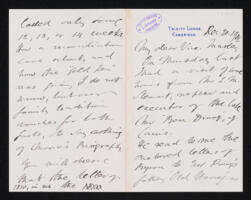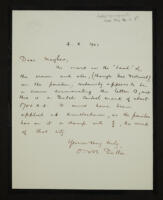The nine letters reflect the two men's shared interest in mathematics and their closer ties of friendship: the discussions of mathematical problems and recent work appear in letters with private nicknames: Brer B'ar and Wicked Will (Johnson) and Brer Crawfish and Bullfrog (Glaisher). Glaisher also shares his opinions on international copyright, the cost of books used by schools, his work editing papers, his preferred work pattern. He writes a good deal about Trinity College life and politics, noting with pleasure the number of Trinity men in the Cabinet, and provides an assessment of Prince Albert Victor at Trinity ("I only hate him when he picks his teeth"). In one 30 page letter dated 25 October 1888 he writes candidly about the internal politics surrounding the election of a Trinity representative to the University Council, and has much to say about certain members of the Trinity College Fellowship: H. M. Taylor, A. R. Forsyth, Arthur Cayley, Henry Jackson, James Ward, J. N. Langley, and the Master H. M. Butler. Accompanying the letters is a note dated 21 Feb. 1891 recording a divided vote on Tutorial accounts which appears to have been separated from an explanatory letter.
17 Great Queen Street, Westminster. - Asks if Milnes has seen Woolner's fine bust of Tennyson, which was exhibited at Dickenson's in Bond Street and is now in Manchester; proposed presentation of bust to Trinity Library; Woolner will not part with original but can supply a copy for £100. Tom Taylor suggests subscribing for an extra copy for Tennyson himself. Invites Milnes to join Committee and encourages others to do so. Does not know Tennyson personally; subscription list 'ought to be wider than his intimate personal friends and narrower than his idolators'.
Gives details of J R M Butler's education to date.
Trinity Lodge, Cambridge.—Encloses six letters (2–7) written by Lord Byron to Henry Drury, which have been bequeathed to the college by the son of the recipient.
—————
Transcript
Trinity Lodge, Cambridge
Dec. 20. 1902
My dear Vice-Master,
On Thursday last {1} I had a visit of some hours from Mr L. M. Stewart, nephew and executor of the late Mr “Ben Drury,” of Caius {2}.
He read to me the enclosed letters of Byron to Mr Drury’s father, “Old Harry” as he was called at Harrow, a Son of Dr Joseph Drury the Head Master.
He left out one sentence in one letter about the Turks, which he told me was disgusting {3}, and I have not seen it.
The letters date between 1807 {4}, when the Hours of Idleness were published, and 1815 soon after Byron’s Marriage.
As there are numerous references to my Father, it may be well just to point out that my Father succeeded Dr Drury at Easter, 1805, and that Byron left the School that summer, i.e. I suppose, at the end of July. Consequently, their relation as Master and Pupil lasted only some 12, 13, or 14 weeks. How a reconciliation came about, and how the “gold pen” was given, I do not know, but our family tradition vouches for both facts, to say nothing of Moore’s Biography.
You will observe that the letter of 1810, in wh. the {5} reference to the “gold pen” occurs, describes the famous swim from Sestos to Abydos, and adds—what I had either not known or forgotten—that the swimmer had made a previous attempt which failed.
May I ask you and Dr Sinker kindly to take Charge of the letters, which Mr Benjamin Drury bequeathed to our Library, and to consider where and in what form they may best be kept. The fact that they are a bequest should be specially recorded.
Perhaps it might also be recorded that Dr Joseph Drury, the Grandfather of the Testator, was himself a Trinity man. His Son, “Old Harry,” to whom Byron wrote the letters, was at Eton and King’s.
I am, my dear Vice-Master,
Most truly yours
H. Montagu Butler
—————
2 folded sheets.
{1} The 18th.
{2} Benjamin Drury’s sister Emily (1813–1902) married Stewart’s father, Lestock Wilson Stewart (1824–1876), an army doctor, in India in 1852.
{3} See the letter of 3 May 1810 (R.2.40A/4). Stewart may well have omitted more than one sentence.
{4} The earliest of the letters (R.2.40A/2) in fact dates from 13 January 1808, but it was misdated 1807.
{5} ‘1810’ struck through.
Advice to N M Butler as a monitor, encourages him to visit the school library, only two Classical candidates for fellowships.
Includes letters by J. O. Halliwell, J. M. Heath about the August 1846 storm in Cambridge, H. Montagu Butler about a bust of Archdeacon Hare, Vernon Musgrave about a memorial to Archbishop Musgrave, with a draft from William Whewell to Vernon Musgrave.
Wright, William Aldis (1831-1914), literary and biblical scholarTrinity College - Thanks him for his kind words, and feels that he is simply doing his duty; 'This life of study and research is my ideal life' and is grateful to the College for enabling him to pursue it.
Tributes to H. M. Butler, Agnata has been looking at houses with a view to moving.
Bills from traders: Crossley and Clarke (booksellers), Blake and Son,drapers, mercers, hosiers, haberdashers and hatters; H. Chatham Shaw, hat maker; E Goshawk, for hair cutting; E. W. Graham; James Woodbridge, tailor, hosier and hatter; E. W. Craker [?], perhaps a cobbler; Bowller & Fuller (butchers?).
Bills from Harrow School itself, for tuition, school charges and repairs etc, the school concert, and the bathing place, as well as paper, pens, ink and so on bought from the school.
Accounts with H. Montagu Butler (headmaster), for Christmas Term 1872, Easter and Christmas Terms 1873, and Easter Term 1874. With stamps and notes by Butler acknowledging payment.
[Trinity Lodge]. 30th anniversary of the death of H M Butler's mother
40 Mecklenburgh Sqr. W.C. Thanks him for his kind words about his edition of Sophocles for the Loeb Classical Library, find his hendecametric experiment a tour de force.
Two letters.
Concerning the Julius Charles Hare bust.
Letter from O. M. Dalton to [Henry] Mayhew [both of the British Museum]; letter from Mayhew to Canon Musgrave (with envelope); three letters from Canon Musgrave to the Master of Trinity [Henry Montagu Butler]; letter from Butler to the Librarian [Robert Sinker].
Typed copy. Shepheard's Hotel, Cairo. Pleased at fellowships for Neil Adam and John Burnaby, Cairo preferable to Alexandria, visit to a native village.
Trinity Lodge, Cambridge - Congratulates Frazer on the honorary doctorate from Oxford. Lunched with the recently arrived Senator Hoar from America, who had bought a copy of Pausanias immediately upon arrival.
Typed copy. Chatby Camp, Alexandria. Has orders to embark.
Trinity Lodge. Death of Andrew Burton, sends George Russell's autobiography.

